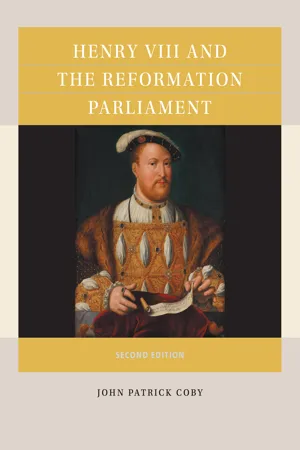
- 176 pages
- English
- ePUB (mobile friendly)
- Available on iOS & Android
Henry VIII and the Reformation Parliament
About this book
Henry VIII and the Reformation Parliament transforms students into English lords and commoners during the tumultuous years of 1529 to 1536. Cardinal Wolsey has just been dismissed as lord chancellor for failing to obtain an annulment of King Henry’s marriage to Catherine of Aragon. Thomas More, the humanist author of Utopia, is named as Wolsey’s replacement. More presides over Parliament, which the king has summoned in the hope that it somehow will find the means to invalidate his marriage, thus freeing him to marry his new love, Lady Anne Boleyn. Matters of state also apply, because Henry has no male heir to carry on the Tudor line, and Queen Catherine has passed her childbearing years. But will Parliament be content with solving the king’s marital and dynastic problems? For there are some in Parliament who wish to use the royal divorce to disempower the English church, to sever its ties to papal Rome, and to change it doctrinally from Catholicism to Lutheranism. Others, however, oppose the divorce, oppose secular supremacy and independence from Rome, and oppose this heretical creed filtering in from the continent. More is their leader, for as long as he can survive. Thomas Cromwell, reputed a Machiavellian, leads the king’s party. The king himself is ambivalent about the reformation unleashed by his “great matter,” as the divorce campaign is called, and so the conservatives are loosed to prosecute reformers as heretics, while the reformers are loosed to prosecute conservatives as traitors. Meanwhile, outside England sits the greatest power in all of Europe, the Holy Roman Empire under King Charles V of Spain — who happens to be the nephew of Catherine! How will the emperor respond to this effort to put aside his aunt?
At issue in the game is the clash of four contending ideas: traditionalist Christianity, reformist Protestantism, Renaissance humanism, and Machiavellian statecraft. Depending on the outcome of this contest, the modern nation-state will, or will not, be born.
Frequently asked questions
- Essential is ideal for learners and professionals who enjoy exploring a wide range of subjects. Access the Essential Library with 800,000+ trusted titles and best-sellers across business, personal growth, and the humanities. Includes unlimited reading time and Standard Read Aloud voice.
- Complete: Perfect for advanced learners and researchers needing full, unrestricted access. Unlock 1.4M+ books across hundreds of subjects, including academic and specialized titles. The Complete Plan also includes advanced features like Premium Read Aloud and Research Assistant.
Please note we cannot support devices running on iOS 13 and Android 7 or earlier. Learn more about using the app.
Information
- The game book (from which you are reading now), which includes background history, rules and elements of the game, primary sources, and essential documents
- One or more accompanying books, which, if recommended, provide additional information and arguments for use during the game
- A role sheet, describing the faction to which you belong and, in many cases, the historical person you will model in the game
- Pass notes to individual players or to factions
- Announce the effects of game actions on outside parties (such as neighboring countries), or the effects of outside events on the game (such as declarations of war)
- Perform scheduled interventions, often determined by die rolls
- Interrupt proceedings that have gone off track or debates that have become overheated
- Reading and Writing. This standard academic work is carried on more purposefully in a reacting game, because what you read is put to immediate use, and what you write is meant to persuade others to act in preferred ways. The reading load may vary with roles (for that done as research is in addition to that done as preparation); the writing requirement is typically ten pages per game spread over an indefinite number of papers (the instructor may make adjustments). Papers are often policy statements, but they might be as well autobiographies, poems, newspaper articles, messages circulated clandestinely, or after-game reflections. In most cases papers are posted on the class website in advance of the next game session for examination by others. Papers written provide the bases of speeches delivered.
- Public Speaking and Debate. In most games every player is expected to deliver at least one formal speech from the podium (the length of the game and the size of the class will affect the number of speeches). Debate is what occurs after a speech is delivered. Debate is impromptu, raucous, and fast paced, and it results in decisions voted on by the body. Reacting instructors may disallow students to read their papers when at the podium or may insist that students wean themselves from this dependency as the game progresses.
- Strategizing. Communication among students is a pervasive feature of reacting games. You will find yourselves writing emails, texting, attending out-of-class meetings, or gathering for meals on a fairly regular basis. The purpose of these communications is to lay out a strategy for advancing your agenda and thwarting the agenda of your opponents, or to hatch plots to ensnare individuals troubling to your cause.
Table of contents
- Cover
- Series Page
- Title Page
- Copyright
- Contents
- List of Illustrations Maps Tables
- 1. Introduction
- 2. Historical Background
- 3. The Game
- 4. Factions and Roles
- 5. Core Texts
- Appendix: Statutes of the Reformation Parliament
- Bibliography
- Acknowledgments